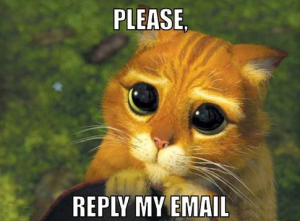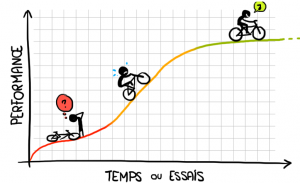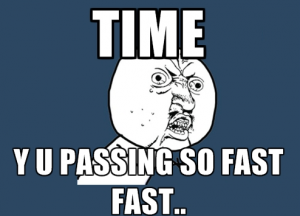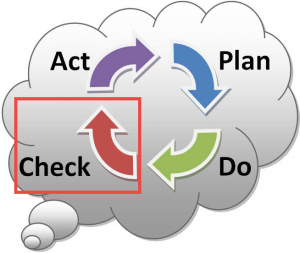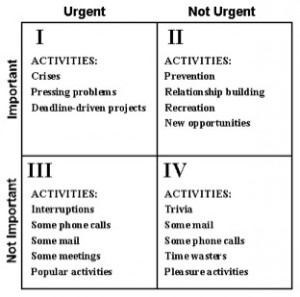Let’s face the reality, in this connected world, time seems scarcer and scarcer!
Every day seems like a rush and we never have sufficient time to do whatever we want to do.
But Why??!
The conclusion I found was:
Time is the same for everyone, so if I don’t have enough time, that’s because I have simply poor skills to manage my time
When I came to this incredible enlightenment (I guess that’s never easy to realize we are bad at something), I took the decision to improve myself and find some ways to become better at time management.
Here’s the 8 strategies that are working for me:
PS: That’s my personal strategies, so if you don’t agree, let me know… you may have better ways that would benefit everyone and that would be a waste to keep that for yourself.
I- Understand that you don’t HAVE TO react to every email you receive
When I was new into the company, I was so excited to get emails from everyone that I had to answer every of them.
I was feeling that I was getting a lot of attention from everyone and that I should return this attention by answering to emails as fast as possible.
Otherwise…maybe I was feeling people would not like me?
This belief is dangerous because I was tying my own happiness to the appreciation of others and to the fact I was answering emails…
When I think about that in retrospect, I think I was kind of silly.
Emails are just a way of communication and people who receive emails are not happy because they received an email, they are happy because I was providing them something they wanted through the emails….my valuable time and expertise.
What I came to realize is that we live in a world in which everyone is in seek of constant attention. Everyone is trying to catch the attention of other people through more or less sophisticated techniques.
The problem being that people who try to catch your attention do that most of the time for themselves, not for your own happiness.
So here’s the advice I am trying to follow:
In every communication I receive, I try to understand first the purpose of the email and if this is something really urgent and important or not.
If this is urgent & important for me, I answer. If this is urgent & important for the sender of the email but not for me, I just ignore (except if it is asked very very nicely 😉 )
II- Being efficient is not only about doing more in less time, it’s about doing it better and finding shortcuts
A lot of people will tell you that saving time is about being efficient and going faster, at that is partly true, but what most of people don’t understand is that being efficient is also about doing things better and understanding better, so no time is lost in decision and execution.
Sometimes, you will be slower at the beginning, but persistence to reach your goal when others forgot about it and doing your job better than everyone else will pay and lead you to win every time.
For some things, it’s kind of obvious:
If my job is to draw graphs and make reports, learn how to use properly excel, word and powerpoint and you will save an incredible amount of time each time you have to do it. Read one example here of how to save time in Excel if you don’t believe.
Some other tasks that can be made faster through the learning of a specific skill are sometimes less obvious:
- Learn fast typing on the keyboard to gain time every day (that wasn’t obvious for me)
- Use some speech recognition software to write your blog posts
- Create a list of everything I have to do before going into a trip to be sure I never forget anything and that I will be always ready on time
- Take classes of fast reading to read more books
- and much more…
At the beginning, changing the way you do things may actually seem less efficient but that’s actually just because there is always a learning curve before adopting a new habit.
When the guy who started fast will be having troubles in the slope, you will be at the top because you trained properly to overcome any slope before even trying.
III- Focus is important, so when you do something, stop everything else
In today’s work environment, it is so easy to be distracted all the time…
For example, in my team, we usually use skype to communicate and so skype was opened almost all the time. Because of that, what happens is that I was distracted all the time.
There is always someone who has something very simple to ask and answering him takes only 5 seconds, but the problem is that it breaks the focus.

When you are trying to concentrate on something important, an idea can come at any moment, but the constant popping of urgent small things just breaks the flow of ideas.
Let me give you an example:
I was trying to establish the plan for a webinar series and thinking about finding creative ideas about the webinar topics, then suddenly Skype is flashing: “Hey Cyprien, do you know where is the model file you sent me yesterday?”….15 seconds later…what was I thinking about?

That’s a bit exaggerated, but imagine that you have Skype, Emails, Linkedin, Facebook, etc… all that piles up to break very effectively your focus and concentration.
How am I doing now?
What I decided to do is to set a specific duration of time to a certain task.
During that time, I allow myself to think only about this one thing that I am trying to do and nothing else. (I am not saying that’s easy T_T…)
And I found that it really works!
Sometimes some people are thinking “Hey, I’m a multi-tasker. I can handle several task at the same time, that’s not a problem” and that’s the trap…because you can, but not effectively and if you have no focus, that will kill your creativity.
I found that when I focus on one thing and only one thing at the time, important and creative ideas begin to flow and I am able to solve problem that I had for several weeks in just 1 or 2 hours.
IV- Do some investigation about how you spend your time every day
That’s something difficult to do, because you have to accept first that you may be losing time during the day on some activities that are neither important, nor urgent.
The thing is that when you are passionate about your job, you don’t see the time passing. It happen frequently that at the end of the day, you are thinking “OMG, it’s already 6PM, I don’t even know what I did today, the time passed so fast…”
It actually happened in the past very frequently that I received an email from someone and that email reminded me about something that I thought I had to do but I never did. What happen then is that sometimes I totally change my schedule and started to do thing that where not in the schedule for today and were neither important, nor urgent.
I decided that I should be frank with myself and I decided to track what I did during the day to analyze later on on which task I sent the more time.
When you think that you have to be accountable for yourself for the time you spend, that’s when you start to calculate and think about your time as a resource rather than just a “flow” that you cannot stop.
You cannot fight with the flow of time, you can only fight about how you manage yourself in the flow. If you do nothing to manage it, you will just go with the flow, if you manage yourself, you will create a boat that will bring you wherever you want to go, that’s it.
V- Review your main goals every morning and the tasks that are related to each of those goals
I think that everyone is making lists of all the things they have to do…the problem is that a list is just a list, that doesn’t tell you the importance, urgency or order of the tasks on the list.
Sometimes, you’ll list up some tasks that you don’t have to to or that you can ask someone else to do.
So that’s what I am doing:
Rather than listing the tasks, I am listing the goals (or sub-goals) that I want to achieve, then I am listing the tasks that I have to perform to advance in each of those goals.
By doing like that, I know that if a task is not relating to any goal, that’s probably that I don’t need to do it.
At the end of the day, I can just review what I did to advance each of those goals and how I went closer to reach them. That brings me an enormous motivation to see that I am going somewhere and I am not being static and just doing the same things over and over again.
VI- Ask yourself every evening what you did effectively during the day and what you didn’t
Any circle of improvement requires a feedback loop.
Whatever you do in the day, if I can think about it every evening, I know what I think I did right and what I did wrong and next day I can try to improve.
Even 1% of improvement can make the difference because 1% every day are compounding at a rate much greater than whatever you can imagine.
If you are not convinced, read this incredible blog post by James Altucher: The 1% rule for creating all habits
Taking some positive action everyday and reviewing the results every evening will make you more and more effective and you will go faster than anyone else.
VII- When you have an idea that “pops up” don’t switch to do it right away, store it somewhere and take some time to think
That’s something that happened very frequently to me before. I have some ideas that just “pop” into my head and at the moment they “pop” they seem to be the best ideas I have ever had…
Because of that I felt obliged to do some kind of action related immediately to be sure this idea will not go away.
What I understood though is that rather than immediately acting, it is much more effective to have a system to store ideas and let those ideas grow in your mind to become much better.
Storing your ideas is not only important for remembering about them, it is also to protect them.
An idea is like a seed, the moment it appears, it is still small and weak and anything can destroy it.
For example, let’s say I just had an awesome idea about building a new marketing campaign based on a specific targeted audience using some specific material. I may think that it is a great idea, but I have no proof of it and if I go directly to my boss and colleagues with this idea, do you know what will happen?
“Yes, Cyprien, i know what you mean, I have thought about this question and I tried something last year but it didn’t work so don’t bother thinking about that, it’s a dead end…”
My idea just died…that’s just too bad.
Very good ideas that didn’t acquire yet the power to justify themselves can die like that very easily.
There may be thousands of reasons why the campaign my colleague did last year didn’t work, but with a weak idea, you go nowhere because you have nothing to back it up, no proof, no example that it will work.
So now, what I do is that I just put all my ideas in my “ideas deposit” and I review them frequently to see if I have something new to add. Once the ideas are strong enough to see the world and that they can be justified, I just think about how I can present them in an easily understandable way which serves to create benefits to the persons I am presenting those ideas.
VIII- When you have too much tasks, list them up and sort them between urgent, important, urgent & important and not urgent, not important (the 4 quadrants method)
Depending on the days, sometimes I need some more “Advanced” tools to organize myself.
It happens that I have sometimes 15 things to do in the morning and thinking about all of that is just too overwhelming that it is tempting to do nothing at all…
That’s when I use the 4 quadrants method.
I divide a sheet of paper between 4 quadrants like that:
Quadrant 1: Urgent & Important
Quadrant 2: Important
Quadrant 3: Urgent
Quadrant 4: Not urgent & not important
Then I assign all the tasks I have to do in each of the quadrants to have a better view or the tasks I should be doing first and those that I should not be doing at all.
Al tasks in Quadrant 4 can be totally deleted, that’s the first advantage of this method.
Then focus is on the urgent & important tasks that I also order.
There is a problem though in this method: Focus comes always to the urgent & important tasks of quadrant 1 and tasks which are “just” important in the quadrant 2 tend to be neglected.
Those tasks are generally tasks that will contribute to your growth and have some huge impact in the long term and if they are not done, you will never see some lasting improvement and you will be always fighting with urgent & important tasks.
That’s where it is important to prioritize and find some specific time of the day to do those important tasks and focus only on those tasks.
So, what do you think after reading all that?
Let me know, I’d like to know what you think

